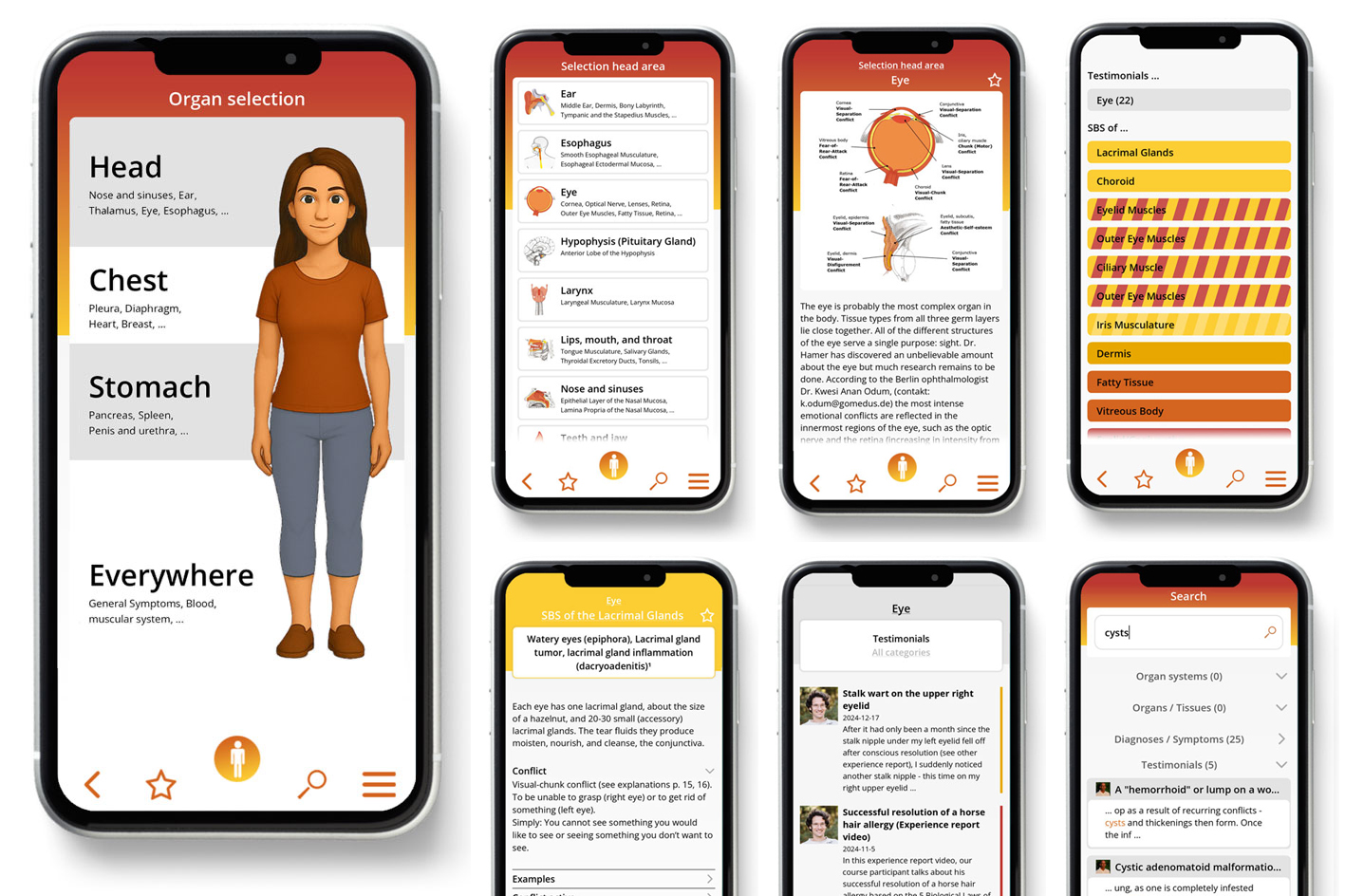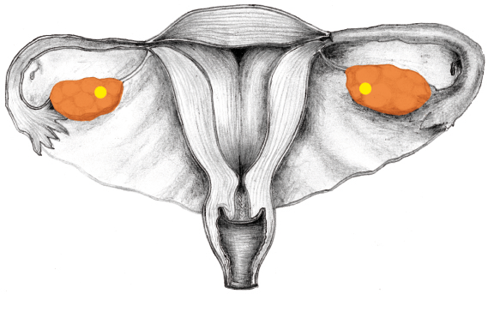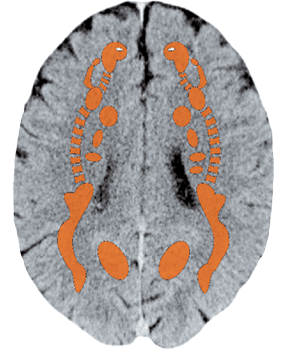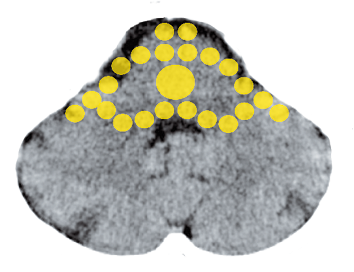 The information on this site is from one of the most famous books about the New Medicine (GNM / 5BN): "The Psychic Roots of Diseases" by Björn Eybl. Since September 2025, it is available in the form of an app with many additional features.
The information on this site is from one of the most famous books about the New Medicine (GNM / 5BN): "The Psychic Roots of Diseases" by Björn Eybl. Since September 2025, it is available in the form of an app with many additional features.It was written in german and was translated into more than 10 languages already. German is not freely available, as the rights are held by a publisher, but all these translations are available as ebooks / PDFs for free, as a gift of Björn for you, for the New Earth, for a new time.
In cooperation with Björn, it is splitted on "Disease is Different" into the sections by organ systems and combined with the real cases of our international testimonial / report archive of the related organ system.
OVARIES
The ovaries have the size and shape of two small plums and lie in the pelvis on either side of the uterus. Except for the corpus luteum, they are made up of mesodermal tissue. The immature egg cells (follicles) are available in limited numbers. At the appropriate time, a small number of them mature to be ova. The female hormone estrogen is mainly produced in the stroma cell tissue of the ovaries. The corpus luteum produces progestogen, the “pregnancy hormone.“
Ovarian Parenchyma
Loss conflict

Corpus Luteum
Severe-loss conflict
SBS of the Ovaries

Ovarian cysts, ovarian cancer1
| Conflict | Loss or fear of loss of close relatives, friends or animals. In my experience, also an unfulfilled wish to have a child (for oneself or substituted for a daughter/granddaughter). One doesn’t feel like they are able to take care of their offspring. Doubts about fertility/ability to procreate. |
|---|---|
| Examples | ➜ Loss of child, husband, partner, parent, friend, or animal, through death or separation. ➜ A child moves far away to another city; the partner dies or turns away.  A 26-year-old, right-handed woman is diagnosed with a 7 x 6 cm (2.5 x 2 in) cyst on the left (mother/child) ovary via ultrasound. Conflict history: Ten months ago, the patient learns that her married mother is having an affair. This comes as a great shock to her, for she believes in the ideal of marital fidelity. She suffers a traumatic-loss conflict, for the affair puts her mother at a distance. Six months ago, her mother ends the affair and the patient can forgive her at once. Their good relationship is restored and the patient is fully confident that her mother will not do such a thing again = beginning of the repair phase, growth of a cyst. Against the advice of her gynecologist, the patient decides against the removal of the cyst, which would have ended her chances of having children. (Archive B. Eybl) A 26-year-old, right-handed woman is diagnosed with a 7 x 6 cm (2.5 x 2 in) cyst on the left (mother/child) ovary via ultrasound. Conflict history: Ten months ago, the patient learns that her married mother is having an affair. This comes as a great shock to her, for she believes in the ideal of marital fidelity. She suffers a traumatic-loss conflict, for the affair puts her mother at a distance. Six months ago, her mother ends the affair and the patient can forgive her at once. Their good relationship is restored and the patient is fully confident that her mother will not do such a thing again = beginning of the repair phase, growth of a cyst. Against the advice of her gynecologist, the patient decides against the removal of the cyst, which would have ended her chances of having children. (Archive B. Eybl) A 70-year-old, retired woman has just made friends with a man she admires. Upon meeting at their first date, he has a stroke and sinks to the floor = traumatic-loss conflict affecting the right (partner) ovary. In the repair phase, a 700 g (25 oz), malignant ovarian tumor develops. CM classifies it as a “colon metastasis.“ (Archive B. Eybl) A 70-year-old, retired woman has just made friends with a man she admires. Upon meeting at their first date, he has a stroke and sinks to the floor = traumatic-loss conflict affecting the right (partner) ovary. In the repair phase, a 700 g (25 oz), malignant ovarian tumor develops. CM classifies it as a “colon metastasis.“ (Archive B. Eybl) |
| Conflict-active | Conflict–active Cell degradation (ovarian necrosis) = “holes“ in the ovarian tissue – generally unnoticed > reduced hormone levels > irregular menstruation, absence or withdrawal of menstruation; with a traumatic-loss conflict before puberty, the first monthly period (menarche) can be delayed. |
| Repair phase | Restoration, inflammation of the ovaries (adnexitis), swelling, pain; one or more cysts grow out of the “holes,“ which begin to fill up with functioning tissue. Along with the histological findings, the size is of primary importance to the diagnosis of ovarian cysts or ovarian cancer. Increased estrogen production. At the beginning of the repair phase, the cysts attach themselves to neighboring organs, which is often mistaken as “invasive growth.“ The cysts detach themselves as soon as they have developed their own blood supply. One should wait and make sure that the conflict is permanently resolved before opting for surgical removal. Possibly also a recurring conflict. |
| Bio. function | Additional ovarian tissue (= tumor) produces more estrogen. This gives the woman more sexual drive (libido). She looks younger and ovulates better > increased chance of becoming pregnant > loss compensation. |
| Note | An ovarian cyst, with its additional estrogen, keeps a woman young. Consider side + handedness. |
| Questions | Diagnosed when? Were the ovaries normal at the time of the last examination? (Yes > conflict resolution afterward, because cysts first begins growing in the repair phase). Which loss affected me during the time period in question? (Death, a loved one (or pet) going away)? Wishing for a child for oneself or for someone else? Doubts about fertility/ability to procreate? (Self or substitute/sympathy)? Was there a death that affected me or was a tragic experience during my childhood? (Examine for conditioning). Did a family member die before or during the pregnancy? (Examine for conditioning). What are my thoughts about my own death? Am I at peace/can I deal with this concept? What do my parents think about it? Did ancestors have trouble/a hard time dealing with death/dying? Which new attitude would be helpful/healing? |
| Therapy | The conflict is resolved, support the healing process. In the case of continued growth: Determine and resolve the conflict, causal conditioning and beliefs. Meditate about death and transience. Recognize that the soul is immortal and that death is a harmless transition into another world. OP, when the ovarian tumor is too large or continues to grow. See also: remedies for the ovaries p. 295. |
Congenital female underdevelopment (Turner syndrome)
According to CM, Turner syndrome is a congenital, hereditary disease with the following primary symptoms: underdeveloped, non-functioning ovaries, small or no breasts and short stature.
Life expectancy, however, is not limited.
As always with hereditary diseases, we must turn our attention to the ancestors – in this case, the female ancestors.
| Conflict | It is dangerous to be a woman; at least nobody may see that one is a developed/sexually mature woman. |
|---|---|
| Examples | ➜ The great-grandmother of a girl was raped during the war under dramatic circumstances. |
| Conflict-active | Limitation of the sexual development in particular and the physiological development in general. Multiple organs and tissue types are affected. |
| Bio. function | The underdevelopment protects against sexual assault. To remain as a child is safer. |
| Repair phase | A certain amount of post-maturing is realistic. |
| Questions | Are the female ancestors fully developed? Dramas in the family? (Rapes, humiliations; unforgiving, embittered women with regard to men)? How do I feel about my own femininity? |
| Therapy | Determine the conflict and conditioning of the female ancestors and attempt resolution. Conversations with the grandparents and aunts, a healing regression meditation for the women in the family. View the trauma again, dignify it and illuminate it with love. See also: remedies for the ovaries p. 295. |
1 See Dr. Hamer, Charts pp. 68 ff, 80
SBS of the Endodermal Portions of the Ovaries

Germ cell tumor (teratoma), ovarian abscess, dermoid cysts1
In this “special“ tumor, one not only finds endodermal tissue, but also skin and hair at times. For this reason, it is often called a “monster“ growth.
According to Dr. Hamer, this originates in the corpus luteum in women.
The teratoma represents a primitive attempt of duplication. This kind of reproduction is found in the simplest forms of life such as in bacteria.
Here, the cell division takes place in the sympathicotonic, old brain schema.
| Conflict | Severe-loss conflict |
|---|---|
| Example | ➜ Loss of a beloved person or animal, loss of a dear relative, friend or partner (death, moving away, quarrel, coma, marriage). |
| Conflict-active | Growth of a teratoma in women originating from the corpus luteum. |
| Bio. function | Reproduction by means of duplication so that the loss can be quickly compensated. |
| Repair phase | Stops growing quickly because of “embryonic growth spurt.“ Mild fever. Ovarian abscess: degradation of the tumor via fungi or bacteria. Dermoid cysts: empty spaces after completed repair. |
| Therapy | Determine the conflict, trigger(s) and conditioning and resolve them. OP if necessary. See also: remedies for the ovaries p. 295. |
1 See Dr. Hamer, Charts p. 24
- Bioidentical hormones according to the findings of Dr. Lee, Dr. Platt, Dr. Lenard and Dr. Rimkus.
- Natural hormones in yam roots (important source), maca roots, beer (hops), blossom pollen.
- Moor mud – internally and externally; moor mud contains a high concentration of natural estrogen.
- Teas: hops blossoms, yarrow, chaste tree seeds.
- Segment massages, foot reflex massages.
- Sacroiliac joint mobilization.
- Natural borax internally.
Testimonials
All experience reports on the organ system “Ovaries” from the International Report Archive:
| Author | Title and Overview | Keywords | ||||
|---|---|---|---|---|---|---|
 | 2025/05/27   I am 40, right-handed, my cycle length is a constant 30 days. After the sudden and dramatic death of my horse | Ovarian cyst | ||||
 | 2022/08/12   My marriage: characterized by economic dependence, less by love, affection and trust. When conflicts arose, my husband regularly threatened to separate. “You'll see how you manage without me!” For years, his threat: “I'll be gone in fall.” ... | Conflict of loss | ||||
 | 2015/01/01   Here is a list of other sources where experience reports with the 5BN can be found, e.g. to:: Bursitis, conjunctivitis, rheumatism, diabetes, hay fever, psoriasis, bedwetting, stuttering, oceans, aggressive constellation, endometrial CA, cervical cancer, shingles, tinnitus, toothache, heart attack, high blood pressure, colic, slipped disc, knee pain, leukemia, bone cancer, voice gone, stomach pain, hives, Epilepsy, intolerances, Crohn's disease, skin rash, facial paralysis, hiccups, anorexia, bronchitis, corneal inflammation, migraine, thyroid cyst, aphthae, osteolysis, gastritis, rectal spasms, milk duct carcinoma, allergies, hepatic coma, gray hair, nail fungus, heartburn, nasal polyps, caries, heart attack, ankylosing spondylitis, melanoma, psoriasis, water belly, hailstones, prostate, . .. |
